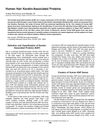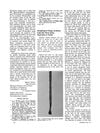 19 citations,
July 2012 in “Biotechnic & Histochemistry”
19 citations,
July 2012 in “Biotechnic & Histochemistry” Less AgNOR protein production is linked to hair loss.
14 citations,
April 2016 in “PloS one” The KRTAP11-1 gene promoter is crucial for specific expression in sheep wool cortex.
13 citations,
September 2012 in “Cell & tissue research/Cell and tissue research” pCLCA2 protein may help maintain skin structure and function.
 11 citations,
January 1997 in “Skin Pharmacology and Physiology”
11 citations,
January 1997 in “Skin Pharmacology and Physiology” A certain inhibitor can slow down the decrease in DNA creation in mouse hair follicles, which might help with hair growth.
 8 citations,
July 2011 in “Animal science journal”
8 citations,
July 2011 in “Animal science journal” Keratin 33A is a key protein in goat winter coats, especially in high-producing breeds.
 6 citations,
November 2010 in “Histochemistry and cell biology”
6 citations,
November 2010 in “Histochemistry and cell biology” The proteins transthyretin and megalin are more present in the growth phase of hair, suggesting they might affect hair health and growth.
 3 citations,
December 2019 in “Biomedical dermatology”
3 citations,
December 2019 in “Biomedical dermatology” Sonic hedgehog proteins may help grow hair.
 1 citations,
October 2020 in “PubMed”
1 citations,
October 2020 in “PubMed” Azelaic acid helps protect hair cells from UV damage and encourages hair growth by increasing certain gene expressions and proteins.
February 2010 in “Journal of the American Academy of Dermatology” The shampoo and conditioner improved dry, damaged hair significantly after three uses.
 May 2023 in “Clinical, Cosmetic and Investigational Dermatology”
May 2023 in “Clinical, Cosmetic and Investigational Dermatology” The research found proteins in human skin cells that help with wound healing and hair growth, which could lead to new treatments.
 97 citations,
March 2002 in “Molecular and cellular biology”
97 citations,
March 2002 in “Molecular and cellular biology” Mutant CDP/Cux protein causes hair defects and reduced male fertility in mice.
 71 citations,
August 2005 in “The journal of investigative dermatology. Symposium proceedings/The Journal of investigative dermatology symposium proceedings”
71 citations,
August 2005 in “The journal of investigative dermatology. Symposium proceedings/The Journal of investigative dermatology symposium proceedings” Hair keratin-associated proteins are essential for strong hair, with over 80 genes showing specific patterns and variations among people.
 47 citations,
July 1967 in “Science”
47 citations,
July 1967 in “Science” Not eating enough protein can cause hair roots to shrink and lose color, and hair to become thinner.
38 citations,
May 2000 in “Livestock production science” Giving high-quality protein or methionine supplements helps improve hair growth in Angora goats and, to a lesser extent, in Cashmere goats.
30 citations,
February 2010 in “The journal of investigative dermatology/Journal of investigative dermatology” Plet-1 protein helps hair follicle cells move and stick to tissues.
 25 citations,
June 2004 in “Journal of Investigative Dermatology”
25 citations,
June 2004 in “Journal of Investigative Dermatology” Macrophage-stimulating protein helps hair grow and can start hair growth phase in mice and human hair samples.
 10 citations,
August 2021 in “EMBO Reports”
10 citations,
August 2021 in “EMBO Reports” The Bcl-2 protein is important for keeping hair follicle stem cells working and preventing hair loss.
 8 citations,
January 2015 in “Genetics and molecular research”
8 citations,
January 2015 in “Genetics and molecular research” Researchers found four key proteins that affect the development of a specific hair type in Yangtze River Delta white goats.
 1 citations,
August 2023 in “Biomolecules & therapeutics”
1 citations,
August 2023 in “Biomolecules & therapeutics” HAPLN1 can promote hair growth and may help treat hair loss.
 June 2024 in “ChemBioChem”
June 2024 in “ChemBioChem” Replenishing free 18-MEA can help restore damaged hair surfaces.

Water and fatty acids affect hair's surface differently based on hair damage, and models can help understand hair-cosmetic interactions.
January 2002 in “China Surfactant Detergent & Cosmetics” Shampoo D is best for fixing perm-damaged hair.
Retinoic acid affects hair growth and can cause hair loss.
116 citations,
April 1986 in “The journal of cell biology/The Journal of cell biology” Trichohyalin is a protein in hair follicles that helps form hair filaments.
 10 citations,
January 2016 in “PLOS ONE”
10 citations,
January 2016 in “PLOS ONE” Researchers found 44 proteins that change during different hair growth stages and may be important for hair follicle function.
 November 2024 in “Applied Sciences”
November 2024 in “Applied Sciences” Placenta products might help with hair loss, but more research is needed.
 October 2024 in “Frontiers in Veterinary Science”
October 2024 in “Frontiers in Veterinary Science” FKBP10 and FBN2 are key proteins for hair growth in cashmere goats.
 September 2023 in “International Journal of Cosmetic Science”
September 2023 in “International Journal of Cosmetic Science” The shampoo improves hair conditioning without using silicone.
 November 2020 in “Research Square (Research Square)”
November 2020 in “Research Square (Research Square)” Keratin injections in mice can stimulate hair growth and might help treat hair loss.
 April 2021 in “Journal of Investigative Dermatology”
April 2021 in “Journal of Investigative Dermatology” A trial showed that a new treatment is safe and effective for male pattern baldness, with most participants growing new hair.






















